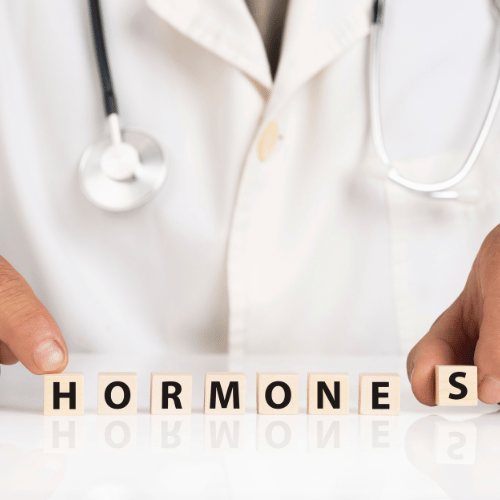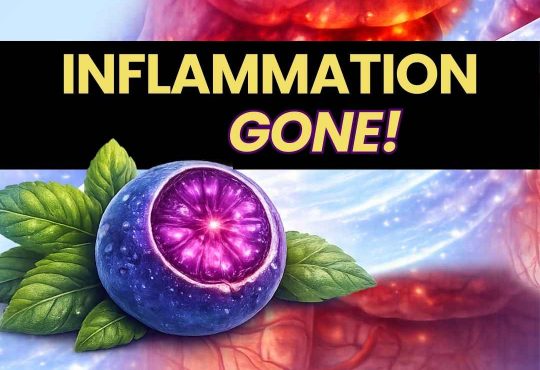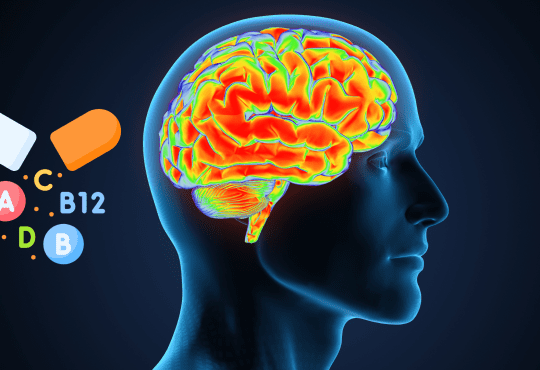
8 Signs of Hormone Imbalance You Should Watch Out For
Hormones regulate virtually every aspect of our bodies, from our metabolic rate and mood to our sleep patterns and skin health.
When these crucial chemicals are out of balance, the effects can be far-reaching and disruptive.
Understanding these signs is crucial because recognizing them early can make a significant difference in managing your health and preventing more serious issues.
Whether you’re dealing with unexplained weight changes, persistent fatigue, or troubling skin conditions, this video will provide you with essential insights into what your body might be trying to tell you.
Now, get comfortable, and let’s get started.
8. Fatigue
Kicking off our countdown at number 8, we have fatigue, a common but often overlooked symptom that can be a significant indicator of hormone imbalance.
If you find yourself feeling constantly tired and lacking energy, even after getting a full night’s sleep, it could be related to an imbalance in your thyroid hormones.
Thyroid hormones, particularly thyroxine (T4) and triiodothyronine (T3), play a crucial role in regulating your body’s energy usage.
They help control the speed of your metabolism—the process by which your body converts food into energy.
When your thyroid is not producing enough hormones, a condition known as hypothyroidism, your metabolism slows down.
This slowdown can lead to feelings of fatigue, as your body is essentially operating at a lower energy level.
Additionally, thyroid hormone imbalances can also affect your ability to sleep well, despite feeling tired, which can compound feelings of fatigue during the day.
It’s not just about the quantity of sleep but also the quality, and thyroid issues can disrupt sleep patterns, leading to unrefreshing sleep.
Fatigue related to hormonal issues isn’t the typical tiredness that follows a busy day; it’s a profound lack of energy that doesn’t seem to improve with rest.
This type of fatigue can significantly impact your quality of life, making even everyday activities feel daunting.
If you’re experiencing this kind of persistent fatigue, it’s essential to consult with a healthcare provider.
They can perform tests to check your thyroid function and determine if your symptoms are due to a hormone imbalance or another underlying condition.
Proper diagnosis and treatment can help manage the symptoms and restore your energy levels, greatly improving your overall health and well-being.
7. Mood Swings and Irritability
At number 7 on our list, mood swings and irritability can be significant indicators of hormone imbalance, particularly involving estrogen and progesterone.
These hormones play vital roles in regulating not only reproductive functions but also mood and emotional well-being.
Estrogen and progesterone levels fluctuate throughout the menstrual cycle, and these fluctuations can affect neurotransmitters in the brain, such as serotonin, which is often called the “feel-good” hormone due to its mood-stabilizing effects.
When estrogen levels are high, they can enhance the mood by boosting serotonin.
Conversely, when estrogen levels drop, as they do before menstruation, they can lead to feelings of sadness or irritability.
Similarly, progesterone is known to have a calming effect on the brain, and low levels can lead to mood swings and anxiety.
These hormone imbalances can become more pronounced during certain life stages such as pre-menstruation, postpartum, and perimenopause, each of which involves significant hormonal changes.
For example, perimenopause, which is the transition period before menopause, involves erratic changes in hormone levels and is often associated with increased reports of mood swings, depression, and irritability.
It’s not just women who may experience mood-related symptoms due to hormone imbalances; men can also be affected.
In men, low levels of testosterone can lead to reduced mood, depression, and irritability.
Testosterone influences many physical processes in the body, and its decline can impact emotional stability and overall mental health.
If you find yourself experiencing frequent or severe mood swings and irritability, it may be worthwhile to explore hormone balance as a potential cause.
Consulting with a healthcare provider can help you understand whether these emotional fluctuations are hormone-related and what steps you can take to manage them.
Treatment might involve lifestyle changes, hormone therapy, or other strategies to stabilize hormone levels and improve emotional health.
6. Sleep Issues
Moving down to number 6 in our countdown, sleep issues such as difficulty falling asleep or staying asleep can often be attributed to hormonal imbalances, specifically involving cortisol and melatonin.
These hormones are critical in regulating our sleep-wake cycles and maintaining overall sleep health.
Cortisol, commonly known as the stress hormone, typically follows a daily rhythm—higher in the morning to help you wake up and gradually decreasing throughout the day to allow your body to relax and prepare for sleep at night.
However, when you’re under constant stress or if your adrenal gland produces too much cortisol, this balance can be disrupted.
Elevated cortisol levels in the evening can lead to insomnia, frequent awakenings during the night, and non-restorative sleep, leaving you feeling tired the next day.
On the other hand, melatonin, often referred to as the sleep hormone, has an inverse relationship with cortisol.
It is produced by the pineal gland in the brain primarily in response to darkness, helping to promote sleep and maintain the body’s circadian rhythm.
Imbalances in melatonin production can occur due to exposure to light at night, such as from screens or artificial lighting, which can suppress its production and disrupt sleep patterns.
Both hormonal imbalances can have a profound effect on sleep quality and quantity, leading to a range of health problems if sleep issues persist.
Poor sleep doesn’t just leave you feeling groggy—it can affect cognitive function, mood, and physical health over time.
Practices such as maintaining a regular sleep schedule, avoiding exposure to bright light before bedtime, and managing stress effectively can help regulate your cortisol and melatonin levels.
5. Persistent Acne or Skin Changes
At number 5, we delve into persistent acne or skin changes, which are common indicators of hormonal imbalances, particularly related to androgen levels.
Androgens are hormones such as testosterone that are commonly associated with male traits and reproductive activity, but they are also present in females and play significant roles in skin health.
In both men and women, androgens stimulate the production of sebum, the oil produced by your skin’s sebaceous glands.
While sebum is essential for keeping your skin healthy and moisturized, excessive sebum production can lead to oily skin, which is a prime environment for acne to develop.
Additionally, androgens can cause the skin cells that line hair follicles to grow more quickly and can lead to pores becoming clogged with dead skin cells and sebum.
This combination often results in inflammation, blackheads, or whiteheads on the skin’s surface.
Moreover, hormonal fluctuations that can lead to acne are not limited to adolescence.
Many adults experience hormonal acne due to hormonal changes associated with menstruation, pregnancy, menopause, or endocrine disorders such as polycystic ovary syndrome (PCOS), which involves elevated levels of androgens.
Changes in skin texture, such as becoming significantly oilier or drier, can also signal hormonal imbalances.
Dry skin can sometimes be linked to low thyroid hormone levels, another crucial regulator of metabolism and skin maintenance.
If you’re experiencing persistent acne or changes in your skin’s oiliness or dryness, it’s wise to consider hormonal imbalances as a potential cause.
Managing this type of acne often involves more than just topical treatments; it may require addressing the underlying hormonal imbalance.
Lifestyle changes, dietary adjustments, and possibly medical treatments like hormonal therapy or medications that specifically target hormone levels could be effective strategies.
Consulting with a dermatologist or healthcare provider can help diagnose if your skin issues are hormone-related and guide you toward appropriate treatments that can restore balance and improve your skin’s health and appearance.
4. Digestive Problems
Continuing our countdown at number 4, we explore how hormonal imbalances can lead to digestive problems.
Hormones play a crucial role in regulating gut function, so any disruptions in hormonal balance can manifest as gastrointestinal symptoms such as bloating, diarrhea, or constipation.
The digestive system is not only influenced by what we eat but also by various hormones that help control appetite, digestion, and nutrient absorption.
One key hormone in this process is serotonin, often thought of as a brain neurotransmitter but also a crucial hormone for the gut.
In fact, about 90% of the body’s serotonin is found in the gastrointestinal tract, where it helps regulate bowel movements and function.
When serotonin levels are disrupted, either too high or too low, it can significantly affect gut motility—the speed at which food moves through the digestive tract.
Low levels of serotonin can lead to constipation, whereas excessively high levels might cause diarrhea.
Serotonin imbalances can also lead to increased sensitivity to abdominal pain and discomfort, commonly experienced as bloating.
Other hormones that influence digestive health include thyroid hormones, which regulate the overall speed of your metabolism.
An underactive thyroid (hypothyroidism) can slow down digestive processes, leading to constipation, while an overactive thyroid (hyperthyroidism) can cause frequent bowel movements or diarrhea.
Addressing these issues often requires a comprehensive approach that might include dietary changes, stress management techniques, and possibly medication to regulate hormone levels or treat specific symptoms.
3. Weight Fluctuations
At number 3 in our countdown, we address weight fluctuations — specifically unexplained weight gain or difficulty losing weight, which are often telltale signs of hormonal imbalances.
Hormones such as insulin, cortisol, and thyroid hormones play pivotal roles in regulating metabolism, and any disruptions in their balance can significantly impact body weight.
Insulin is a critical hormone produced by the pancreas that helps regulate blood sugar levels by facilitating the transport of glucose into cells to be used for energy.
However, insulin resistance, a condition where cells in muscles, fat, and the liver don’t respond well to insulin and can’t easily take up glucose from the blood, can lead to higher insulin levels.
This condition not only elevates blood sugar but can also cause increased fat storage, leading to weight gain.
Cortisol, often called the “stress hormone,” is produced by the adrenal glands and helps control blood sugar levels, regulate metabolism, and reduce inflammation.
However, prolonged stress can lead to chronically elevated cortisol levels, which can promote fat storage, particularly in the abdominal area, and make weight loss more difficult.
As we’ve touched on earlier, thyroid hormones, including thyroxine (T4) and triiodothyronine (T3), regulate the body’s metabolic rate — how fast your body burns calories.
An underactive thyroid (hypothyroidism) can slow down metabolism, leading to weight gain, while an overactive thyroid (hyperthyroidism) can cause weight loss.
These issues can sometimes be subtle and gradual, making them hard to identify without medical tests.
2. Menstrual Irregularities or Severe PMS
At number 2 on our list, we find menstrual irregularities or severe premenstrual syndrome (PMS), which are significant indicators of hormonal imbalances in women.
These symptoms often point to issues with estrogen and progesterone, two hormones that are critical for reproductive health and the regularity of the menstrual cycle.
Estrogen and progesterone levels naturally fluctuate throughout the menstrual cycle, which is essential for normal reproductive functions. However, when these hormones are out of balance, it can lead to a variety of symptoms.
For instance, too much estrogen relative to progesterone can lead to heavy, painful periods and more severe PMS symptoms, including mood swings, bloating, and breast tenderness.
On the other hand, low levels of estrogen can lead to missed periods or no periods at all, a condition known as amenorrhea.
Irregular menstrual cycles, which might include cycles that are too long (more than 35 days), too short (less than 21 days), irregular, or absent, can also indicate hormonal imbalances.
These irregularities can be a symptom of various health issues, such as polycystic ovary syndrome (PCOS), thyroid disorders, and other endocrine disruptions that impact hormone levels.
Severe PMS can also be exacerbated by hormonal imbalances and is characterized by extreme discomfort and emotional symptoms that significantly interfere with daily life.
This can include severe depression, irritability, and anxiety that occur in the lead-up to menstruation.
1. Hair Loss or Thinning
At the top of our list, number 1 is hair loss or thinning, which is a particularly distressing and noticeable sign of hormone imbalance.
This issue often leads individuals to seek medical evaluation, as it is a visible manifestation of underlying health problems, often related to imbalances in thyroid hormones and androgens.
Thyroid hormones, including thyroxine (T4) and triiodothyronine (T3), play a crucial role in regulating the metabolism of almost every tissue in the body, including hair follicles.
An imbalance in these hormones, such as in hypothyroidism (low thyroid hormone levels) or hyperthyroidism (high thyroid hormone levels), can disrupt the hair growth cycle.
Typically, hypothyroidism can lead to hair becoming dry, brittle, and thin all over the scalp, while hyperthyroidism might cause significant hair thinning that is noticeable across the entire scalp.
Androgens, such as testosterone, have a complex role in hair growth and loss.
While necessary for hair growth, an excess can lead to hair loss, particularly in the pattern seen in male and female pattern baldness (androgenetic alopecia).
In women, this might manifest as thinning hair along the crown of the head, while men may notice receding hairlines and bald spots.
This symptom is not only cosmetic but can also be a sign of systemic health issues.
Treatment for hormone-related hair loss may involve addressing the hormone imbalance directly, such as through medication to manage thyroid dysfunction or treatments to block excessive androgen effects.
Additionally, nutritional support and other therapies may be recommended to support hair health and regrowth.
And there you have it, our exploration of the top 8 signs of hormone imbalance.
Remember, hormones play a pivotal role in regulating numerous bodily functions, and maintaining their balance is essential for optimal health.
Being proactive about your hormonal health not only helps alleviate troubling symptoms but also supports your long-term health and vitality.
Thank you for joining us in learning about these crucial signs of hormone imbalance.
Stay informed, stay healthy, and take proactive steps towards maintaining your hormonal balance for a healthier, happier life.









